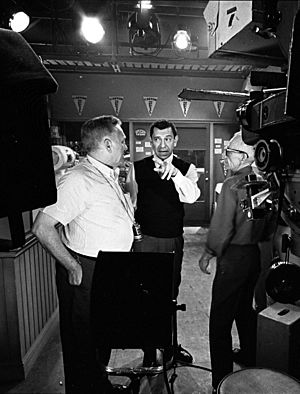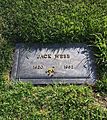Jack Webb facts for kids
Quick facts for kids
Jack Webb
|
|
|---|---|
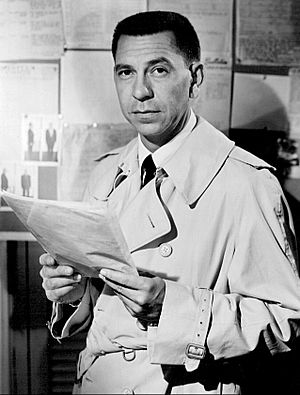
Jack Webb as Joe Friday in Dragnet (1957)
|
|
| Born |
John Randolph Webb
April 2, 1920 Santa Monica, California, U.S.
|
| Died | December 23, 1982 (aged 62) |
| Resting place | Forest Lawn Memorial Park (Hollywood Hills) |
| Other names | John Randolph |
| Occupation | Actor, producer, director, screenwriter |
| Years active | 1932–1982 |
| Spouse(s) |
Dorothy Towne
(m. 1955; div. 1957)Jackie Loughery
(m. 1958; div. 1964)Opal Wright
(m. 1980) |
| Children | 2 |
John Randolph Webb (born April 2, 1920 – died December 23, 1982), known as Jack Webb, was an American actor, producer, director, and writer. He is most famous for creating and starring as Joe Friday in the popular Dragnet TV series and movies. He also founded his own production company, Mark VII Limited.
Webb started his career in the 1940s on radio. He created the radio show Dragnet in 1949. In the 1950s, he brought Dragnet to television on NBC. Later, he created other well-known shows like Adam-12 (1968) and Emergency! (1972). Webb was known for making his shows very detailed and realistic. Many of his works focused on law enforcement and emergency services in Los Angeles. He often used his shows to share his ideas about important topics.
Contents
Jack Webb's Early Life
Jack Webb was born in Santa Monica, California, on April 2, 1920. He grew up in the Bunker Hill area of Los Angeles. His father left before Jack was born, so he never knew him.
As a child, Webb went to Our Lady of Loretto Elementary School. He later attended Belmont High School in Los Angeles. He was even elected student body president! In his high school yearbook, he wrote about the "magnificent warmth of friendship" he felt. After high school, Webb studied art at St. John's University in Minnesota.
During World War II, Webb joined the United States Army Air Corps. He later left the service to support his mother and grandmother.
Webb's Career in Entertainment
Starting in Radio and Film
After leaving the Army, Webb moved to San Francisco. He got a temporary job at ABC's KGO Radio because there weren't many announcers during the war. He had his own comedy radio show called The Jack Webb Show in 1946. Before that, he had a show called One Out of Seven, where he acted out news stories. On this show, he often spoke out against unfair treatment of people.
By 1949, Webb switched from comedy to serious dramas. He starred in Pat Novak, for Hire, a radio show about a private detective. This show was known for its tough, detective-style writing. Webb also appeared in other radio shows like Johnny Madero, Pier 23 and Pete Kelly's Blues.
In 1950, Webb acted in three movies that became very popular. He was in Sunset Boulevard, a famous film. He also played a war veteran in The Men, which was Marlon Brando's first movie. In the detective film Dark City, he worked with Harry Morgan, who would later be his co-star on Dragnet.
Webb's most famous movie role was in the 1957 film The D.I.. He played a tough Marine Corps drill instructor. This serious style of acting became a big part of his later roles.
The Success of Dragnet
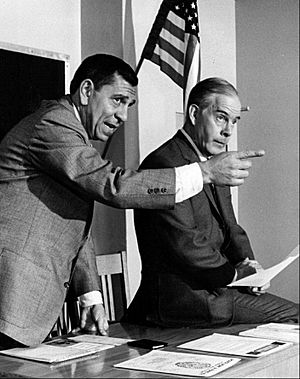
Jack Webb had a role in the 1948 film He Walked by Night, which was made to look like a real-life police report. This film helped inspire him to create Dragnet. With help from the Los Angeles Police Department (LAPD), Dragnet started on NBC Radio in 1949. It became a TV series in 1952 and ran until 1959. Webb played Sgt. Joe Friday, and Barton Yarborough played Sgt. Ben Romero. After Yarborough passed away, Ben Alexander joined the show as Officer Frank Smith.
Webb was very careful about getting details right in Dragnet. He wanted viewers to see how realistic police work was. He had great respect for police officers and wanted to show them as everyday heroes. Dragnet was different from earlier shows that sometimes showed police in a bad light. In 1954, a full-length movie version of Dragnet was released, starring Webb and Alexander.
Webb also tried to share his love for jazz music. In 1951, he started a radio series called Pete Kelly's Blues. This show later became a movie in 1955, but neither was very successful.
Webb in the 1960s
From 1962 to 1963, Webb was the main producer for GE True, a TV show where he also hosted and sometimes directed or acted.
In 1963, Webb took over a big role at Warner Bros. Television. He made many changes to the detective series 77 Sunset Strip, but these changes were not popular with viewers. His time at Warner Bros. ended in late 1963.
Soon after, Webb started working with Universal Television to bring Dragnet back. The new Dragnet series began in 1967 and ran until 1970. To tell it apart from the old show, they added the year to the title, like Dragnet 1967. This new version focused on preventing crime and helping the public.
In 1968, Webb and his partner R.A. Cinader created Adam-12 for NBC. This show was a spin-off of Dragnet. It followed two LAPD officers, played by Martin Milner and Kent McCord, as they patrolled the city. Adam-12 ran for seven seasons and was Webb's second-longest running TV series.
Also in 1968, Webb and Johnny Carson did a funny skit on The Tonight Show. It was called the "Copper Clapper Caper" sketch. Webb played Joe Friday, investigating a robbery at a bell factory. Carson played the factory owner. They used lots of "c" and "cl" sounds in their dialogue, trying not to laugh!
Later Years: 1970s and 1980s
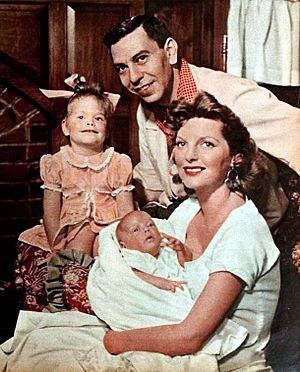
In 1970, Webb decided to stop Dragnet and focus on producing more shows. In 1971, he created two new series: The D.A., about district attorneys, and O'Hara, U.S. Treasury, about a U.S. Treasury agent. Neither of these shows lasted very long.
Later, in 1972, Webb and Cinader launched Emergency!. This popular show was about the fictional Station 51 Rescue Squad of the L.A. County Fire Department and their work with a hospital emergency room. Webb even cast his ex-wife, Julie London, and her husband, Bobby Troup, in the show. Emergency! ran for six seasons and was a huge success. It also led to several TV movies and even a cartoon show called Emergency +4.
Emergency! was Webb's last big hit. He continued to produce other shows like Hec Ramsey and Project UFO, but they didn't last as long.
Before he died, Webb planned to bring Dragnet back for a third time in 1983. Five scripts were written, and Kent McCord from Adam-12 was chosen to play Joe Friday's new partner.
In 1987, a comedy movie called Dragnet was made as a tribute to Webb. It starred Dan Aykroyd as Joe Friday's nephew and Tom Hanks as his partner. Harry Morgan also returned to play his role from the TV series.
Webb's Personal Life
Jack Webb loved jazz music. He had a collection of over 6,000 jazz records! He also played the cornet. His love for jazz led him to meet singer and actress Julie London. They married in 1947 and had two daughters, Stacy and Lisa. They divorced in 1954. Webb married three more times: to Dorothy Towne, then to former Miss USA Jackie Loughery, and finally to Opal Wright.
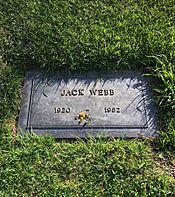
His daughter, Stacy Webb, helped write a book about her father called Just the Facts, Ma'am: The Authorized Biography of Jack Webb. Sadly, Stacy passed away before the book was published.
Death and Legacy
Jack Webb died from a heart attack on December 23, 1982, at the age of 62. He was buried at Forest Lawn, Hollywood Hills Cemetery in Los Angeles. His funeral included full honors from the Los Angeles Police Department. The LAPD Chief, Daryl Gates, announced that badge number 714, which Joe Friday used in Dragnet, would be retired forever to honor Webb. Webb was buried with a replica LAPD badge that had the number 714.
Jack Webb has two stars on the Hollywood Walk of Fame, one for his radio work and one for his television work. In 1992, he was added to the Television Hall of Fame for his important contributions to TV.
Filmography
Movies
| Year | Title | Role | Notes |
|---|---|---|---|
| 1948 | He Walked by Night | Lee | |
| 1950 | The Men | Norm | Marlon Brando's first movie |
| 1950 | Sunset Boulevard | Artie Green | |
| 1950 | Dark City | Augie | |
| 1954 | Dragnet | Sgt. Joe Friday | Also director |
| 1955 | Pete Kelly's Blues | Pete Kelly | Also director and producer |
| 1957 | The D.I. | Gunnery Sgt. Jim Moore | Also director and producer |
Television Shows
| Year | Title | Role | Notes |
|---|---|---|---|
| 1951–1959 | Dragnet | Sergeant Joe Friday | 276 episodes |
| 1967–1970 | Dragnet (1967-1970) | Sergeant Joe Friday | 98 episodes |
| 1968–1975 | Adam-12 |
—
|
Co-Creator, Executive Producer, Writer |
| 1972–1976 | Emergency! |
—
|
Creator, Executive Producer, Director (5 episodes) |
Discography
- Songs from Pete Kelly's Blues (1955)
- You're My Girl: Romantic Reflections by Jack Webb (1958)
Images for kids
See also
 In Spanish: Jack Webb para niños
In Spanish: Jack Webb para niños
 | Chris Smalls |
 | Fred Hampton |
 | Ralph Abernathy |


